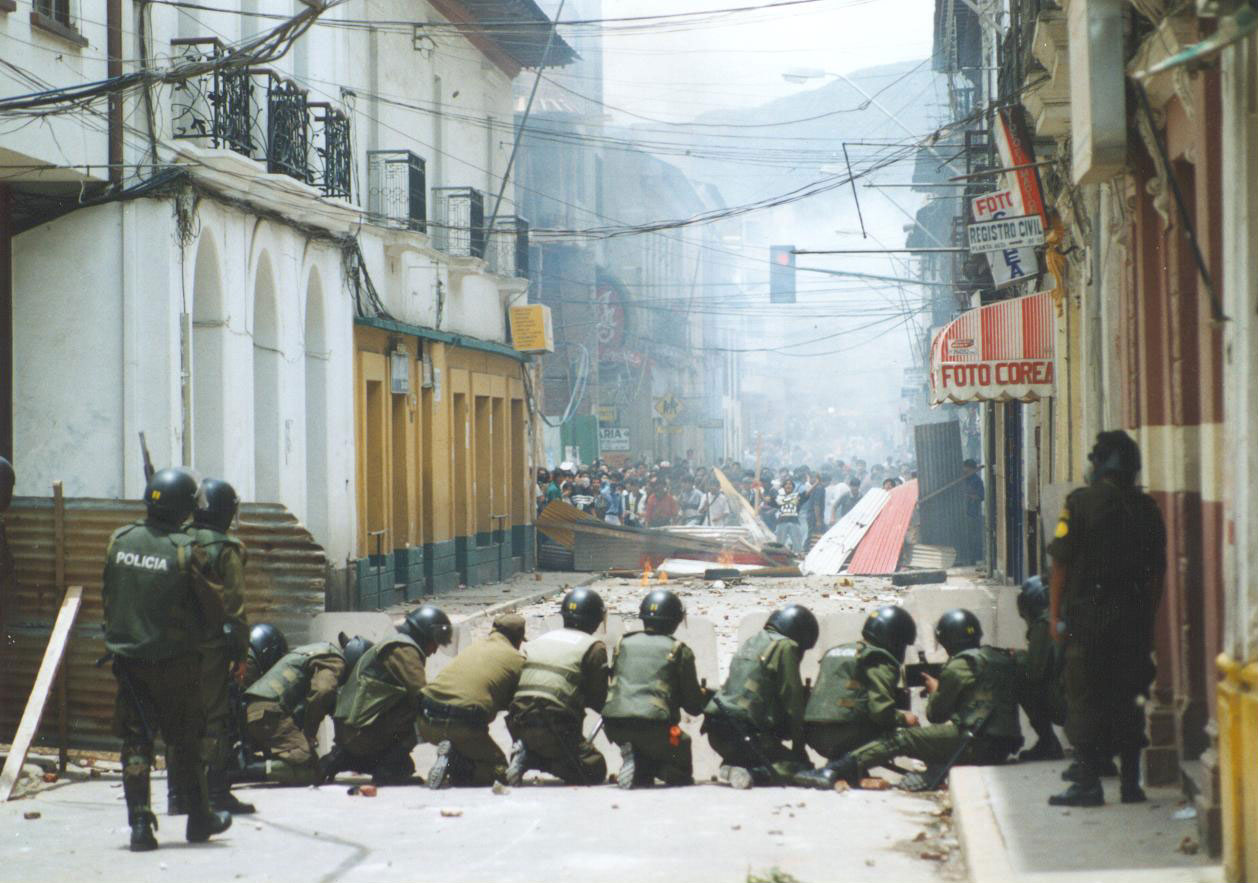Latin America
Related: About this forumTwo Bolivian journalists threatened after reporting on police scandals
Two Bolivian journalists threatened after reporting on police scandals
Bogotá, March 27, 2015--The Committee to Protect Journalists condemns death threats that, according to CPJ interviews and news reports, were made against two Bolivian TV journalists investigating police corruption in central Cochabamba state, and calls on authorities to bring those responsible to justice.
On March 23, a note containing a bullet was attached to the door of Escarley Pacheco's home in Cochabamba city, threatening the reporter for La Red ATB, one of Bolivia's largest TV stations, with sexual violence and death, according to reports. A photograph of the handwritten note, published on news websites, showed the paper apparently stained with blood. The note read: "This bullet has your name on it." It also said: "You never should have stuck your noses into the lives of others... What a pity that you will never investigate anything else in your life."
The threat followed a March 14 incident in Cochabamba in which the door to the apartment of another ATB reporter, José Miguel Manzaneda, was stained with a blood-like substance, according to news reports. An accompanying note said: "Be careful, J.M," the reports said.
"The fact that the threats against Escarley Pacheco and José Miguel Manzaneda came after their reporting on police corruption is particularly worrisome," said Carlos Lauría, CPJ's Americas senior program coordinator, from New York. "Authorities must take all necessary steps to ensure an independent investigation and guarantee the journalists' protection."
More:
https://cpj.org/2015/03/two-bolivian-journalists-threatened-after-reportin.php
Judi Lynn
(160,656 posts)Heavily controlled by the right-wing, racist, oligarchy, it has surfaced repeatedly in the few stories which do make it to US corporate news, once when it was the center of the Cochabamba water riots, during which the government of fascist President Hugo Banzer brought snipers into place to end the opposition to a vicious economic trap for the poor, by a subsidiary Aguas del Tunari, of the Bechtel Corporation. Aguas del Tunari had control of all water, raised the price so high poor people were unable to afford adequate water altogether, and had no choice but to protest, at which time Banzer brought violence into play to be used against the indigenous citizens.
[center]


Government sniper brought to pick off protesters.
~ ~ ~[/center]
Wikipedia:
~ snip ~
“The Bechtel family has owned Bechtel since incorporating the company in 1925. Bechtel's size, its political clout, and its penchant for privacy have made it a perennial target for journalists and politicians since the 1930s. Bechtel has maintained strong relationships with officials in many United States administrations, including those of Nixon, Reagan, George H. W. Bush, and George W. Bush. The company also has strong ties to other governments, particularly the Saudi Royal Family.
Recently, the company has come under criticism for alleged mismanagement of the Big Dig project, its financial links to the bin Laden family, and the manner in which it received Iraqi rebuilding contracts after the U.S. invasion of Iraq in 2003. Politicians in the United States and in Europe have made accusations of cronyism between the George W. Bush administration and Bechtel.
More:
http://en.wikipedia.org/wiki/Talk%3ABechtel
[center]~ ~ ~[/center]
Regarding the "constitutional capital of Bolivia," Cochabamba:
In Bolivia racial violence is being encouraged and promoted by regional governments, civic committees and right-wing political organisations.
Evo Morales, who cut his teeth as an indigenous political leader through his campaigns for the coca-leaf growers union in the tropics of Cochabamba, has developed a revolutionary discourse born out of Bolivia’s social movements which is anti-imperialist, anti-colonial and anti-neoliberal.
This consists mainly of the principles of defence of national sovereignty, of natural resources, and of land, equality between men and women and respect for human rights. This political praxis has formed the basis for public policy. However, these policies are being resisted internally and externally by those who are opposed politically, ideologically and culturally to the revolutionary process that the Bolivian people are living, breathing and building.
The opposition, which operates through civic organisations, regional governments, business groups and the media - meanwhile - has constructed a rhetoric or, if you like, a counter-discourse which turns President Evo Morales’ good qualities into bad ones, accuses him of being an indigenous-fundamentalist, undemocratic, an enemy of private investment; a foe of the middle classes and a defender of centralised government in opposition to regional autonomy.
This discourse, which is being used to paint both the President and the process of political change as a force for ill, has created an atmosphere which is intended to breed conditions for social and racial violence towards Bolivia's indigenous and working classes.
Dramatic manifestations of such social and racial violence, which are tolerated and encouraged by political nuclei of the opposition were seen in the city of Cochabamba in January 2007, in Sucre in September 2007 and May 2008; in Santa Cruz in August and December 2007 and May 2008 and in the regions of Beni and Pando in June 2008. Organised groups planned and carried out violence against indigenous people and peasants, and they publicly expressed their collective discourse through racist phrases such as: “fucking indian”.
More:
http://www.newstatesman.com/south-america/2008/06/bolivia-violence-indigenous